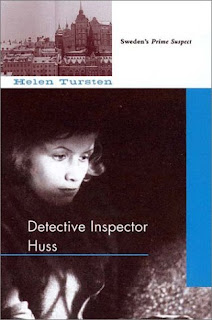Still
reeling with hangover from Martin Cruz Smith's eight-novel
vodka-sodden Arkady Renko crime series, I felt the need for a
freshening change somewhere a tad more wholesome. Sweden seemed just
the ticket, I decided, after reading Bitter
Tea and Mystery
blogger Tracy K's enticing
review
of a novel by Helene Tursten. I forthwith downloaded Tursten's first
in her series featuring Irene Huss, a detective in the Göteborg
Police Department's Violent
Crimes division.
The opening
scene in Detective
Inspector Huss
was so startling I came close to hopping into the pickup for
a run
to the ABC store to pick up a fifth of Beluga
in
case I needed to chase away what I assumed were lingering Renko
demons. In the scene, a filthy rich international financier plunges
to his death from his high-rise apartment in Göteborg.
That’s precisely how Wolves
Eat Dogs
begins, except the filthy rich international financier who splats
awkwardly on the street below his high-rise apartment is in Moscow.
Renko and his vodka-swilling
sergeant had
to
fight bureaucrats, international criminals, and
maniacs
for
the entire novel before
determining
whether the Russian financier was murdered or committed suicide. It
took Göteborg’s
medical examiner several seconds to decide
the Swedish financier was murdered, and
Huss and about a dozen Göteborg
detectives and forensic technicians, the rest of the novel, with
cooperation from everyone except the suspects, to know
whodunnit and why.
Pure police procedural. Twice
longer than I prefer in a crime novel, but ultimately a satisfying
depiction of the problems, strategies, and techniques involved in a
complicated, high-profile investigation.
My
only nit to pick with the plot structure is the investigating team
coming off as too experienced, too well oiled for what we are told at
the beginning:
“Glamorous TV murders like the von Knecht case almost never
occurred. But when they did, the police were completely at a loss.
Suddenly there were all kinds of tender toes they had to avoid
stepping on. They couldn’t proceed in their usual way with the
investigation.” True, the detectives were restricted to the book—no
rubber hoses—when questioning the usual suspects, and they did, the
only deviation being Detective Inspector Birgitta Moberg kneeing a
suspect in the balls after he shoved her against a wall and grabbed
her crotch. The “cute, young, blonde” detective suffered sexual
harassment as well from at least one of her male colleagues, but only
with words and pornographic pictures. (I learned that her colleagues
outed another male team member, in a later novel in the series, as
the sender of the pictures.)
The
novel doesn’t shy from addressing the tensions in a traditionally
male police force dealing with female members, but Tursten handles
the issue without the stridency one might expect in modern fictional
treatments. There’s an earnest rudder steering the conflicted
sensibilities through these unfamiliar waters. The team’s boss,
Supt. Sven Andersson, struggles with his own biases, constantly
correcting himself mid-word when slipping into locker-room language
referring to women, and Det. Inspector Irene Huss, a former European
judo champion, has won respect as a veteran of the force.
Andersson, who also has issues with aging, including his own, quickly
apologizes to Huss, excluding her from his reference to the local
female prosecutor as “another old crone.” But Huss reflects to
herself:
“Again
the problem of attitudes toward middle-aged, competent women. Why
were they so intimidating? She realized that she herself was well on
the way to joining this group of women. But Andersson never seemed to
feel threatened by her, even though she was a bona fide expert
detective. Evidently because he knew her and liked her, in his eyes
she never grew older.”
 |
| Göteborg |
No
one objected, however, when Andersson used an unflattering metaphor
to describe the imperious medical examiner, Yvonne Stridner,
“undeniably one of the country’s most talented pathologists,”
we are told. After viewing the body on the street and pronouncing it
a murder, “she
hurried off...Irene watched her go and said, ‘She’s actually
quite human.’
“Andersson
snorted. ‘Human, her? She’s got the emotional life of a backhoe!”
This gave me my first genuine laugh of several throughout the novel.
Having a bad day, Huss tried to remember a song to describe it,
wondering if it was one of Frank Sinatra’s. She gave up. “Didn’t
make a damned bit of difference which old fart it was. It was a
rotten day even before it got started. And after it worked for her on
a subway she shared a trick for handling people who stare at you in
public: “She gave the woman in the suit a radiant smile and sat
down. That’s the most effective way to startle people:
They think you’re crazy and instantly avert their eyes.”
The novel pokes into other
current societal issues that involve the detectives and their
suspects.
Huss
visits a young man dying of AIDS, whose mother tells her his
condition is so bad he must be fed intravenously:
“That’s not something I can take care of. Thank the good Lord
that the national health-care system is still functioning!”
There
are drug-dealing biker gangs and racist skinheads. One of Huss’s
two teenage daughters shaves her head to join a punk band spewing
anti-Semitic lyrics that advocate killing Jews. The girl argues that
it’s the music that interests her, not the lyrics, but when Huss
presses her the daughter claims the Holocaust was fiction. Huss then
invites one of her colleagues to dinner with her family (her
husband’s a professional chef), and in a deeply moving scene the
detective tells the story of his own family. His mother’s father
was unknown, a young Nazi who participated in a gang rape of the
detective’s Jewish grandmother. Shocked, but still disbelieving,
the Huss daughter runs to her room and slams the door, sobbing
loudly.
Larsson borrows a Finnish
detective from another division to interview a Finnish woman who
cleaned the financier’s apartment. Finnish immigrants, we learn,
are a disrespected minority in Sweden.
The story takes place over the
days leading up to Christmas, but Göteborg, second only to Stockholm
as Sweden’s most populous city, is having trouble getting into the
holiday spirit, what with seemingly endless icy winds and freezing
rain. It didn’t help that retailers had started their push earlier
than usual in order to “suck as much as possible out of people now
that income tax refunds weren’t paid out at Christmas anymore.”
 |
| Helene Tursten |
I
hit a speed bump early on, when Tursten described in minute detail
the pricy features in the financier’s luxurious apartment. Too much
detail can easily clog a narrative, robbing me of the pleasure of
using my imagination from just a bare sketch of details as cues.
Ordinarily I’m apt to abandon a novel were such distractions to
persist. Possibly it did with Detective
Inspector Huss,
but if so, the narrative was so smooth and tightly written I was able
to skate over unnecessary (to me) descriptive sections without losing
track of the story. I’m curious to see how Tursten’s craft and
her characters develop in subsequent outings of Irene Huss’s team.
As they apparently have not all been translated into English, and
those that have are not in sequential order,
I have yet to decide which
one I should choose next.
[For
more Friday's Forgotten Books check the links on Patti
Abbott's unforgettable blog]

I enjoyed this novel also, Mathew. All the points you made were very good. Especially about the tensions between some of the male detectives and the females in the group. I felt that aspect was handled realistically. Her novels, at least the two I have read were a bit longer than I like too but I was entertained, and that is what I am looking for.
ReplyDeleteMe, too, Tracy. Thanks for acquainting me with Tursten's work!
DeleteHaven't read any of Tursten yet, but I have seen the impressive tv series based on them (on the MHz Worldview network). One of the best of the crime-drama series I've seen on that little public broadcasting network (in the same league as the Italian NERO WOLFE films).
ReplyDeleteAlmost makes me regret not having TV.
Delete